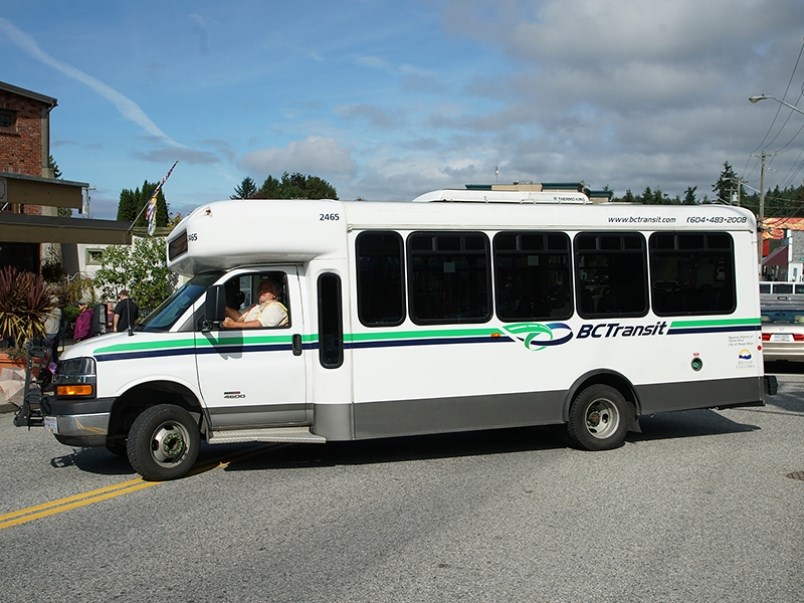Powell River’s transit system is in need of review, according to a seniors advocate.
Maureen Tierney, seniors community council member, speaking at the Tuesday, October 1, City of Powell River committee of the whole meeting, said her group has found transportation to be an area of major concern for seniors and their families, both through handyDART and regular transit.
“Like you, we have, and continue to receive concerns and complaints about handyDART from organizations and individuals,” said Tierney.
She said what has become clear is: drivers need sensitivity training on how to interact with seniors and they need to be given adequate time for pickup and drop-off of seniors with disabilities to decrease the stress of tight scheduling; more capacity is needed; and there is a need for extended hours.
Tierney said there is a need for a new transit assessment, with the last one having been done in approximately 2013. She added that because the system may never be able to meet all of the demand for handyDART service, other ways need to be found to supplement existing services.
“We continue to promote Powell River as an accessible and age-friendly community, and as a result, we have a record number of retirees moving here,” said Tierney. “However, in a number of areas, as we are told, Powell River is not keeping pace with the services required for our aging population.”
Knowing demands for handyDART services may never be fully met, there is a need to look at ways to supplement the service that is provided, said Tierney. An example includes a taxi-saver program, where a handyDART client can purchase taxi coupons at a discount.
Improvements also need to be made with the regular transit service, according to Tierney. She said there are currently 300 bus stops, only 17 of which have shelters with benches, making it difficult for seniors, especially in inclement weather.
She added that the size of the current buses in Powell River prohibit access to areas where stops are needed. For example, the top of Duncan Street has in excess of 100 housing units with seniors and the top of Glacier Street has a subdivision of new senior-friendly patio homes. There are other areas of the city with concentrated seniors housing and Tierney said none of these areas can accommodate the buses because they are too long.
“There is no room for the bus to turn around,” she said. “Most of our buses operate with very few riders for most of the weekdays and always on weekends. Why are smaller buses not an option?”
Also, distances between many bus stops are too great and many seniors cannot walk the distance from their home to the closest bus stop, or if they do walk, they have to stand because there is no shelter or seating, according to Tierney.
Many seniors do not find the bus scheduled user-friendly, and many seniors don’t know how to use the bus and are afraid to try, said Tierney. A transit ambassador program may help, she added.
“We ask that council review their transit budget, as well as their commitment to making Powell River an inclusive, more accessible and age-friendly community,” said Tierney. “Failing to do so could well increase the isolation of our seniors.
“Our community should continue to strive to empower and support all seniors to access all our community has to offer. This should mean, as much as is possible, giving them the means to do so.”
Tierney said seniors would like to see public consultation and a transit assessment on how to make the transportation system work better in Powell River.
“We may not have the budget to do it all but we need changes and we need to do transportation better,” said Tierney.
City director of infrastructure Tor Birtig said he has spoken with BC Transit with regard to a service review. The last review was finalized in 2015 and typically BC Transit do them every five years, according to Birtig.
“Now, we can put in a request to do a review of our transit system and handyDART to take a look at these numbers,” said Birtig. “We need to look at all these things holistically. I think our first step is to request BC Transit to do a review of, especially our handyDART service, and what we need to move forward on this.”
Birtig said BC Transit representatives should be available to attend a committee of the whole meeting in November.



